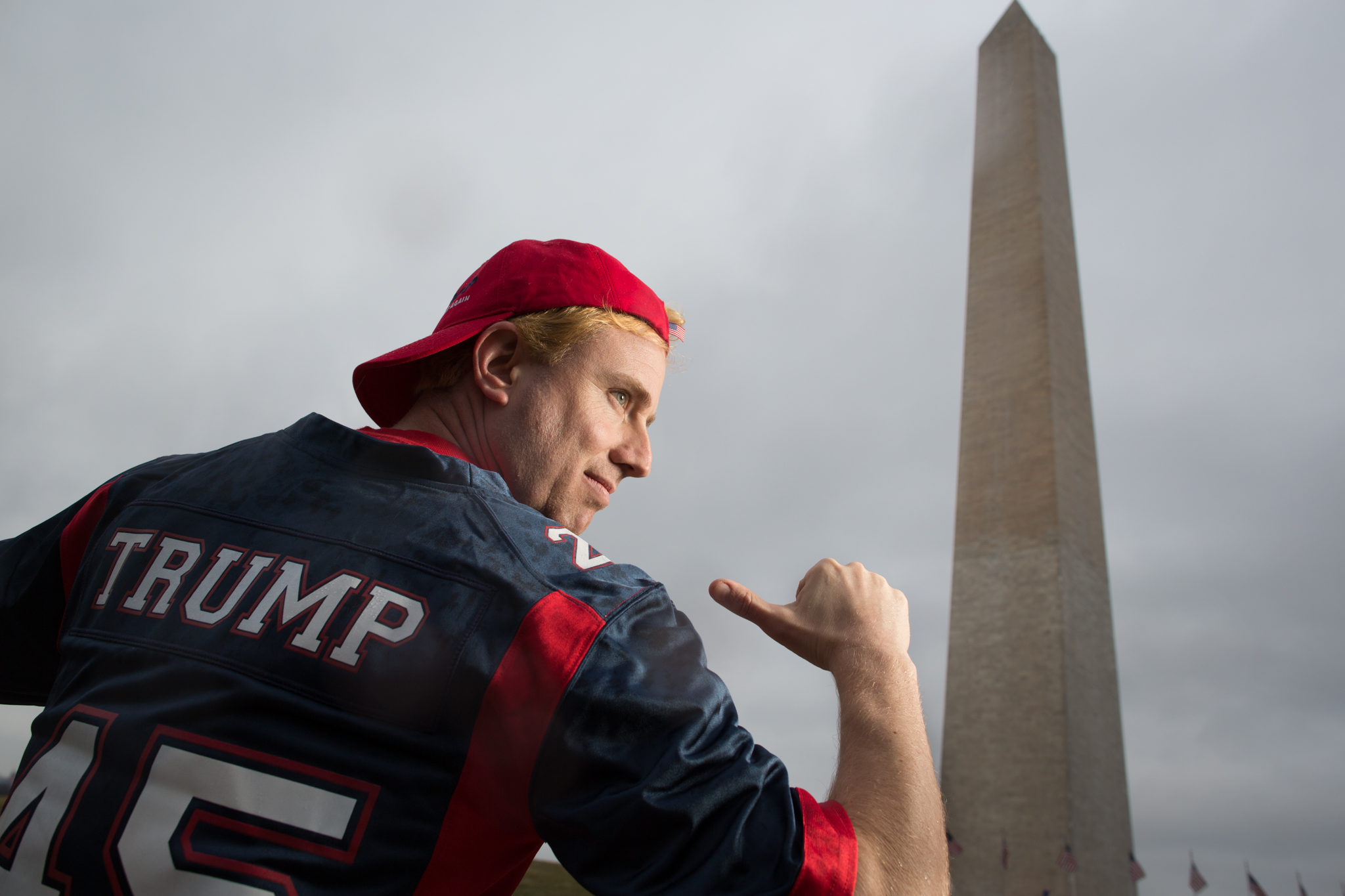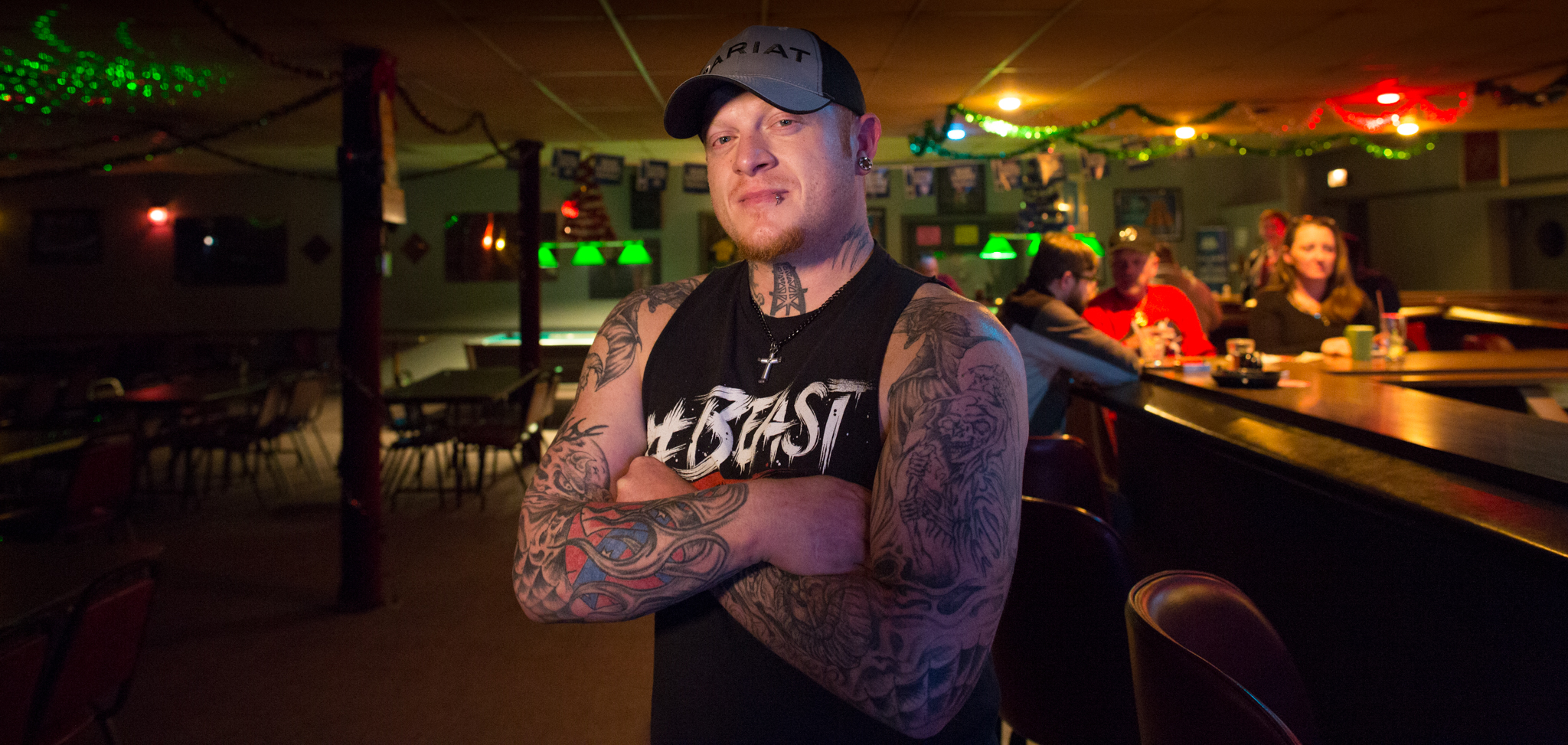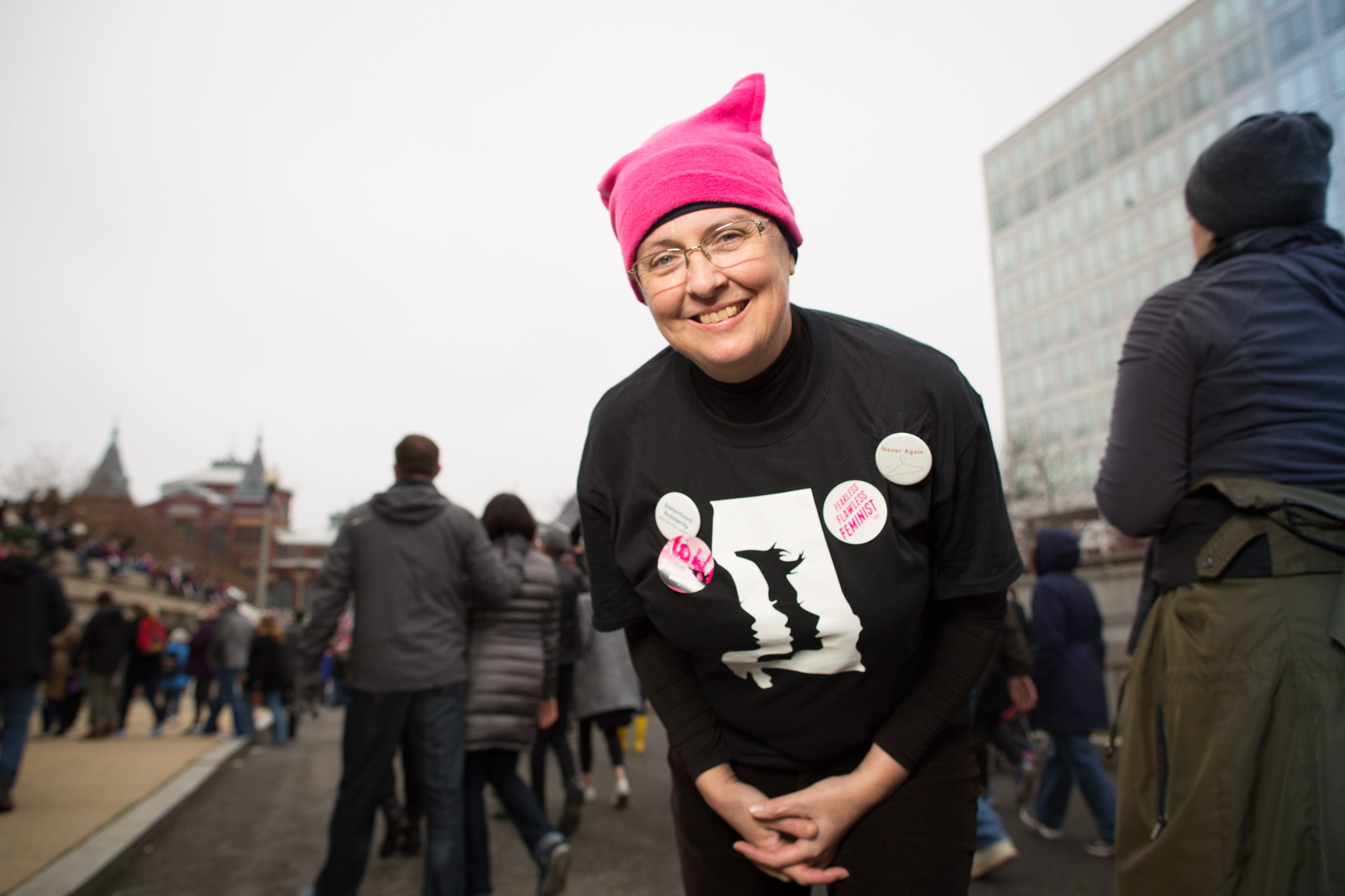
Alice Dilbeck, 58, of Harvest, Alabama is retired from the software solutions industry. She traveled to Ohio to work on the Hillary Clinton campaign. After the election, Dilbeck was one of the local organizers for the Alabama chapter of the Women’s March on Washington.
The Women’s March was a worldwide protest on January 21, 2017. At the Women’s March on Washington at the National Mall, we talked to women from across Appalachia. Meeting people from around the nation, we focused on those living in Ohio, Alabama and Pennsylvania. Some identified as Republicans, some had identified as Democrats, some voted for Donald Trump, some voted for Hillary Clinton – but all had something to say about women’s rights.
Dilbeck: I grew up in Alabama. There are lots of people who are progressive. And I think lots of people bite their tongue because they don’t want to get into arguments, you know we’re very polite in the South.
I know lots of people who may have voted for Donald Trump because they have a strong anti-abortion stance. There are those of us who believe that it’s women’s right to choose and those who believe it’s murder. I don’t know how we bridge that gap.
I came up on a bus with 53 women and men from Huntsville, Alabama. That’s one of nine buses that came from Alabama under the march affiliated buses. We brought almost 500 people. And that’s just a fraction of who’s here from Alabama.
Today is important because it shows a great deal of unity among a diverse set of people, all of whom are invested in the democratic ideal and who are disturbed by the lack of adherence to that ideal throughout the last election cycle.
I believe that all people matter. I believe that the government is there to make sure there is an equal playing field and sometimes to level the playing field when people have been historically disadvantaged.
I’m a lesbian. So it seems to me that obviously there’s some impetus on the GOP side to make sure that I don’t have the right to be married, and that I don’t have the right to have protection under the law.
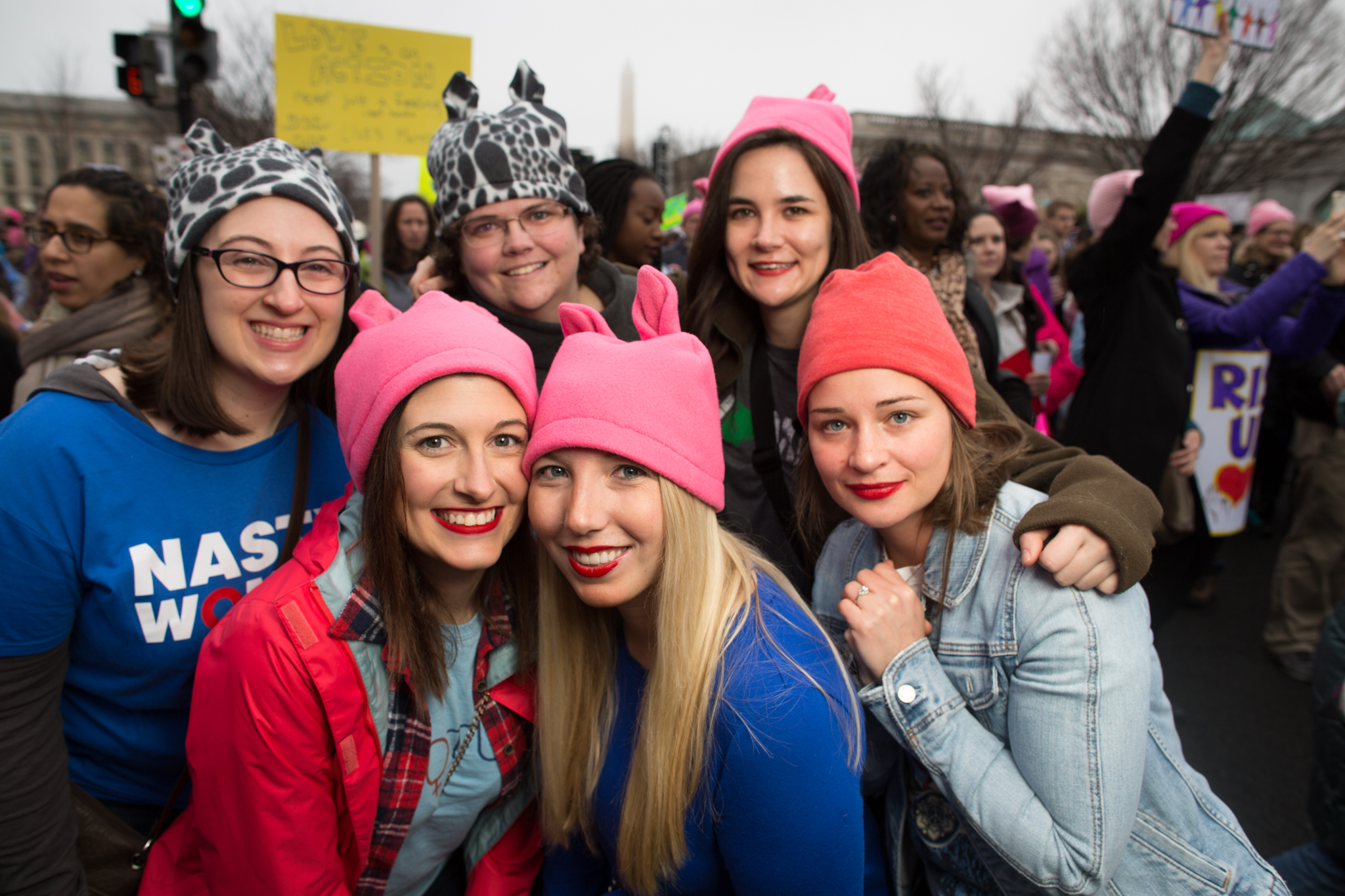
Riley Lichtenstein, 29, came to the march with five childhood friends from Athens County, Ohio. Some of the women still live in Athens, while others have moved to cities such as Columbus and Pittsburgh. Lichtenstein, a purchasing manager, now lives in Pittsburgh.
Lichtenstein: I was born and raised in Athens, Ohio. Lived there from birth until college. When you grow up in Appalachia you see a lot of things that I don’t think the rest of the world is used to seeing. Certain things just become the norm. Half of your graduating class is below the poverty line. It’s sad. It’s just a regular day-to-day thing.
I am here today because I do not believe that the new president of the United States respects women or their rights, or equality in general.
I am a registered Republican, and I want people to know that right is right and wrong is wrong. I voted for Hillary Clinton. While she might not have been my ideal candidate, it came down to right and wrong and treating people with respect.
I am here with five girls. It started out at as a 30th birthday trip for one of my high school friends. Then the march came about so we decided that it was sort of a two-for-one. We’ve known each other our whole lives. They were my support system since my parents felt a little differently during the election than I did.
My friend’s mother made these hats. She lives in Athens and she FedExed them so that we all had them to wear today. They’re a word that I don’t want to say on microphone! The hats are in support of women. Women everywhere have been wearing them, so you see them and you know that you’re on the same team and you’re fighting the same fight. It’s amazing to see this many people that have come together that feel the same way I do. It’s sort of emotional because it’s been a rough couple of months for people that feel like their voices haven’t been heard.
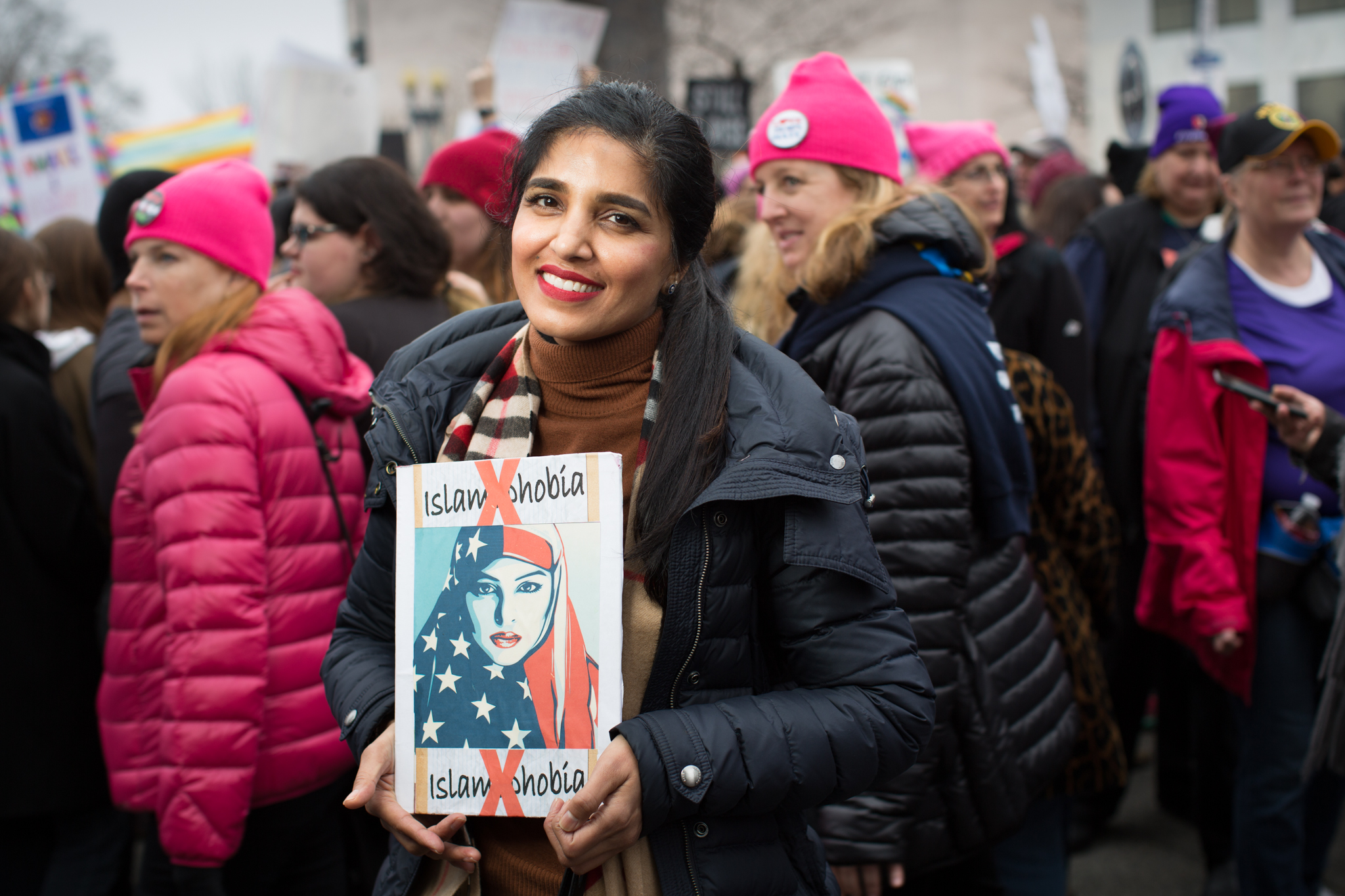
Nazia Hussain, in her late 40s, lives in the Chambersburg area of Franklin County, Pa. and works at home.
Hussain: This is our home. Coming back from Pakistan, we burnt our boats. There is no other place that we call home. And this is not the America that we left our country to come here for. I love this country. We left our country to come here because we love the values, the morals of the country and the people. And now all of a sudden, it’s like going back to any third world country — which I refuse.
I have three boys. I have two in college, one in high school. I’m not just doing it for myself, I’m doing it for my children and their children.
The reason I’m marching is because I am so sick and tired of going through this drill every time my children are on the plane or we are traveling or something. When the boys are on the plane they cannot have a beard. And my last name is Hussain, so it’s already like a big thing to begin with.
I am a hundred percent for security. Just like the security of any other children or anybody, any United States citizen. I want security for my children when we are walking around, I don’t want anybody who’s not a patriotic citizen doing something. So, I’m all for security. But do not tell me when you see my child with a beard and then thinking that you know he’s less than anybody. When you tell me that my child is a terrorist, you are dismissing my upbringing in that second. Because for me, when you call somebody a terrorist, he’s not a Muslim — period.
I’ve been stopped a bunch of times and asked, ‘Are you a Muslim?’ and I said, ‘Yeah.’ I have been asked if I’m related to Saddam Hussein. I’m not even offended by it. They don’t know, so, it’s okay to ask. As Muslims I think we have to be open-minded. Ask me, but don’t assume. When I look at a person I’m not looking at their religion. What I do behind closed doors and in privacy, whoever I talk to for my peace of mind, is my business. Get to know a Muslim and then make your opinion.
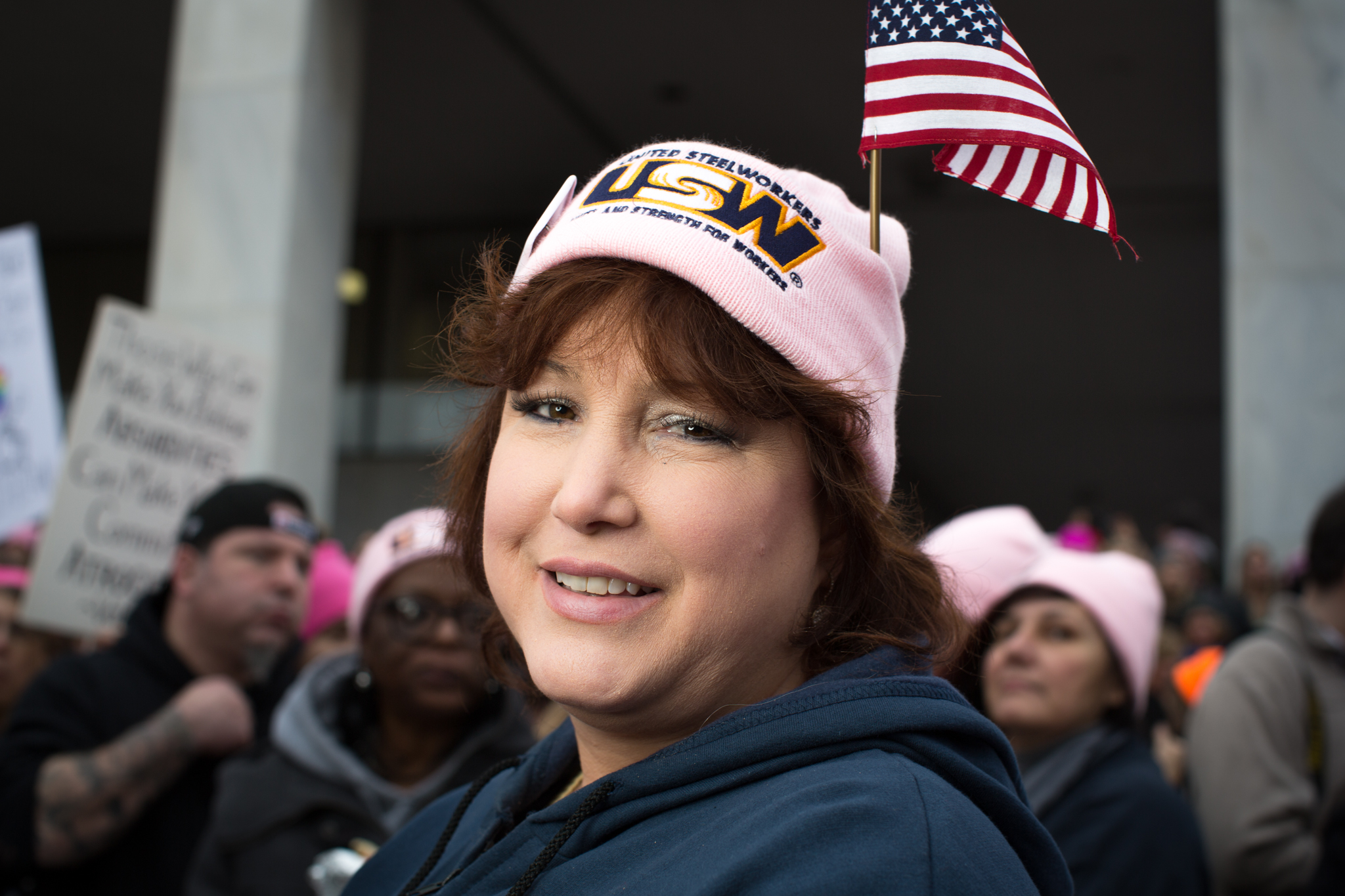
Jodi Jenkins, 49, from Pike County, Ohio is a mother and grandmother. Jenkins works as a laborer in the uranium enrichment plant. She voted for Donald Trump and came to the march to stand up for women’s rights.
Jenkins: I’m here with the United Steelworkers, specifically the ‘Women of Steel.’ We organize and rally and fight for women’s rights. The United States is so far behind compared to other countries. It’s not law that women get paid for maternity leave. I am here to fight for that and fight for equal work/equal pay. Where I work, at the uranium enrichment plant, I actually get paid what the man beside me gets paid. But, I know that women don’t all get that, so I’m here to fight for those people and for my granddaughter.
Like most in her area, Jenkins supported Donald Trump in the election and assumes most at the march did not. She had some advice for overcoming those differences.
Jenkins: I don’t have to agree with everything. I’m just here to stand up for what I think is good – which would be equal work/equal pay and paternity leave and maternity leave. I think you need to just stand strong for what you believe in and fight. I think solidarity can make a difference, can make a change. Strength is in numbers. Get a group of people together and I think they can make a difference.
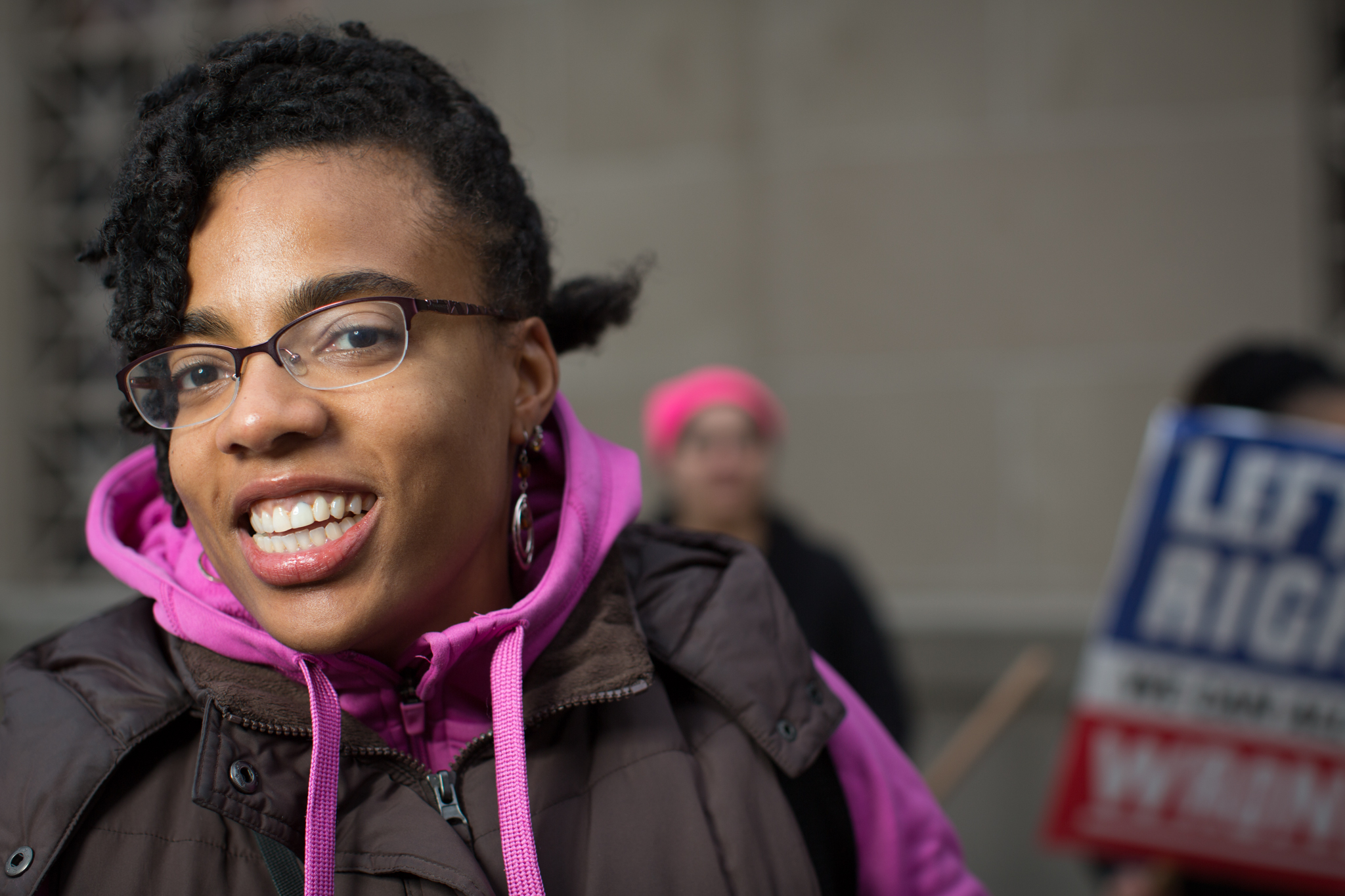
Cryshanna Jackson Leftwich, 37, a professor at Youngstown State University traveled to the Women’s March with students. Jackson is a 2002 graduate of West Virginia University.
Jackson Leftwich: I am here today because I’m a professor in the political science department and we think it’s important to teach our students how to participate in democracy, the democratic process, and how to have your voices heard outside of the election polls. We want to ensure equality. We want to support the Constitution but we also want to make sure that we are promoting laws and policies that are equal and just for all.
We want to hold our government accountable. We want the government and the administration to know we’re a democracy — we are the people.
I want to be heard on everything. But more specifically, I think it is important to the groups that don’t have a voice, that are under-represented — women and minorities. I think it’s important to speak for them.
In ‘100 Days, 100 Voices’ Nancy Andrews presents photographs depicting the diversity of voices across Appalachia. These portraits strive to show the varied faces, passions, issues and opinions from around the region. Interviews have been edited for brevity and clarity. If you have an idea for ‘100 Days, 100 Voices’ please contact Nancy Andrews on Twitter @NancyAndrews or email at nancy.andrews [at] mail.wvu.edu.


